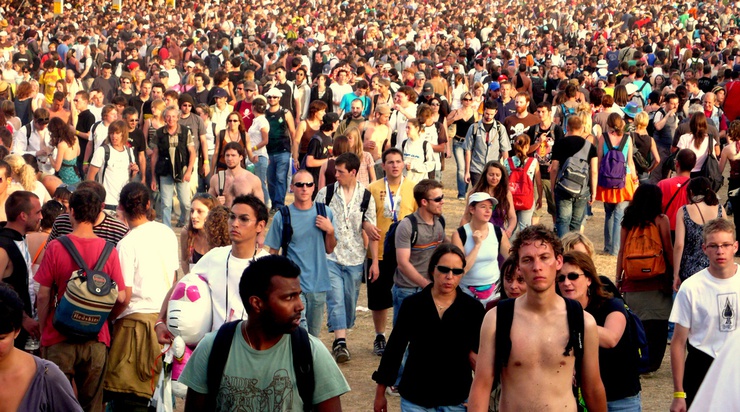
HMV, Virgin closures: get thee to live music festivals
Published on
Translation by:
HayleyBoth Virgin in France and HMV in the UK going into administration is bad news for the music industry. Yet the live music industry is still going strong, with artists continuing to draw in large audiences to concerts
On 14 January 2013, Virgin Megastore went into administration, followed the next day by the famous British record store HMV. These two events confirm that sales figures for CDs and DVDs are rapidly decreasing throughout the world. For example, the number of CDs sold has fallen by 70% in the past decade. Whether it's Virgin, HMV or Fnac in France, vendors of these so-called cultural goods are victims of the declining physical media market (which includes CDs, DVDs and books). Two main reasons for this phenomenon include the tough competition between merchant websites such as amazon, and the increase of places to listen to, as well as download, music on the internet (such as Spotify, Deezer or Grooveshank),.
Born to be a live
Live performance is an area of the music industry which has survived the financial crisis. Contrary to popular belief, the constrictive economical situation does not necessarily mean a decreased consummation of cultural goods. French cinemas announced a record number of visits for between 2011 and 2012. Live performances are also still popular with their audiences; France's IRMA (information and resource centre for popular music forms) database records no less than 1, 457 current music festivals in Europe. Many of these festivals welcomed record numbers of visitors in 2012. In France for example, garorock (Marmande, south-western France, 28 - 30 June 2013) welcomed 50,000 visitors in 2012, compared to 35, 000 in 2011 – this is an increase of 40%. The eurockeenes festival in Belfort (on the Swiss-French border between 4 - 7 July 2013 - ed) had more than 100, 000 visitors during its last edition, compared to 93, 000 in 2011. Even events such as the big festival (17 - 21 July 2013) are seeing larger audiences, with 17, 000 visitors in 2012 compared to 14, 000 in 2011.

Elsewhere in Europe, the san miguel primavera sound festival in Barcelona confirms this pattern, recording an increased number of visitors to the festival since it started (7, 700 in 2001 and 12, 3300 in 2011). The number of visitors to Sziget in Hungary, named the best European music festival in 2011, has also increased, from 382, 000 in 2010 to 400, 000 in 2011. These events are attracting international audiences to such an extent that even travel agencies are offering all-inclusive packages to festival-goers – tickets, transport and hotel included - whereas campsites are also finding themselves overwhelmed with the increased numbers.
Read 'Five reasons not to attend Benicassim festival' on cafebabel.com
The reason why travel agencies are now interested in music festivals is simple: music festivals are economically beneficial to the towns and regions where they are held. As well as creating employment in the area, the festivals also bring about an increase in consummation, especially in the catering and hospitality industry. It is also true that festivals can help improve the town's image, especially with young people.
What do festival-goers think?
Anni and Natlia, both 32, and Jaime, 27, have already reserved tickets for the roskilde festival in Denmark. ’I like the idea of being able to travel and be part of a cultural event at the same time,’ explains Natalia. ‘We always go to as many concerts as possible, and at the same time it allows us to explore a new region.’ Jaime agrres: ‘It allows us to visit towns that we would never have thought of visiting if there hadn't been a festival there.’
Andreia and Ricardo, both 26, are Portuguese but currently reside in Barcelona. 'The feeling of being part of a community is very strong,’ they explain. ‘We like to be part of a group and share our emotions. Some festivals have also been the 'place to be' for a few years running now. Some people like to get themselves seen and heard there – these places are the new trendy places to be, and can sometimes be a bit like catwalks!’
'The feeling of being part of a community is very strong'
These statements show that music is not only ‘cool’ or ’hipster’, but it is also the preferred means of escape from reality for so many of us. As they are a sort of mixture between a concert and a party, music festivals allow us to have a unique experience in a completely new and rather disorientating environment. The organisers of these events, and even their advertising agencies, have caught on to this. It's not just about selling a product: nowadays, there is more interest in the experience rather than the actual physical object. Advertising agencies put feelings at the heart of their campaigns and try to sell us much more than a simple product or service: they try to sell us emotion, and the phenomena of streaming and downloading music – as well as going to music festivals - are both simple illustrations of the different ways to enjoy this emotion. Even if it is certain that anyone can download a song or album on the web, no technology will ever replace the feeling of going to a live concert.
Images: main courtesy of © We Love Green; in-text Eurockéenes 2008 (cc) prezz/flickr/ video (cc) roskildefestival/ youtube
Translated from L'industrie musicale part joyeusement en live



